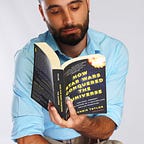It had been a while since I watched Supernatural, one of my favorite television series, but with all the serialized content out there I couldn’t fit it into my schedule. This summer, I filtered out shows that continued to disappoint during the 2015–2016 season, so I got myself back on the Supernatural wagon. After watching Episode 918[1], I am beyond happy I did.
The episode cleverly entitled “Meta-Fiction” was an ode to all ideas related to something that Metatron himself asks in the episode’s teaser[2]: “What makes a good story?” — a question that all writers continue to try and answer. As the episode progressed, the writers brilliantly began listing the different ways they have essentially kept this show going for so long. This coming season the show will be premiering its twelfth season.
So, having loved the episode because it spoke to me as a writer, I decided to compile all of Metatron’s lessons and commentary on narrative and share it with all of you with a little of my own added spices.
METATRON’S TIPS ON THE PERFECT NARRATIVE
1. The universe is made up of stories not atoms.
In a lot of ways as a writer I totally agree with this non-scientific hypothesis that the world is made up of stories rather than atoms. Think about it. Ever since the dawn of man, we have passed down stories from generation to generation. Stories that could be personal, factual, or even stories that are pure fiction like folk and fairy tales. We are built on tales from the past. But we also dream and have goals and plans — so in a sense we are creating our own narratives for what we hope will be how our lives pan out.
2. Steal from the best…and by steal I mean learn
Yeah, you got me — I added the part after the ellipsis, but I stand by my clarification. Nothing will get a writer to write better than reading, researching and watching films and television series. When you do that, you are in fact learning from those who have been doing it for much longer than you have. Even with a Master’s in Screenwriting, I still continue to grow and learn as a writer. Whenever I write something new, I send it out for consultation so that I can track where I am advancing as a writer and where I am still weak. I read screenplays whenever I can, and books with new techniques. I listen to podcasts and lectures…anyway I am sure you get the point. Learning from the best is in a sense stealing their techniques or how they handled certain narratives and using them to become a stronger writer.
3. Every hero needs a GREAT villain.
It’s not rocket-science but it is true, although yet again the word ‘great’ was my own addition. The reason I added this is that we seem to have a lack in believable, and threatening villains as of late. We, as an audience, don’t seem to worry about our heroes regardless of the apocalyptic terror they are in because nothing about it seems life or death, even the apocalypse. In a recent video essay from Lessons from a Screenplay, the channel host dissects why the Joker in the The Dark Night is the ultimate antagonist. I also wanted to share his views because they help cement this idea of what Metatron stated:
- An antagonist must be exceptionally good at attacking your hero’s greatest weakness[3].
- An antagonist must pressure the protagonist into difficult choices.
- An antagonist must be competing for the same goal as the protagonist.
4. Set up interesting characters and see where they lead me.
Whether it’s a film or a television series, you got nothing if you don’t have interesting and likable characters, yes even your villain needs to be likable. Your audience will remember complex and interesting characters from films, and will come back to watch those characters on television. In Aristotle’s Poetics, he states that Plot is Character + Reason, which in essence means that without character our plot will flounder. The great thing about creating great characters is that when you do, they will end up taking control of the narrative in the best ways possible.
5. What writer doesn’t love a good twist?
It’s true. We writers would love to catch the audience off its guard and smack them across the face but the problem is that audiences are becoming smarter, and we have a harder time of staying one step ahead. This is why storytelling is evolving and transforming constantly to keep audiences on their toes and satisfied. There are lots of ways writers can create good twists and I will be posting a blog post about that soon.
6. It didn’t turn out as I planned — that is why we rewrite.
I cannot stress enough how important, essential, and necessary the rewriting process is to writers. For my most recent short film, I had around ten drafts. Screenwriters believe that rewriting is where the actual work begins. The first draft is called the throw-away draft for a reason. The rewriting process is where a writer can add color, mood, better dialogue, and work on the voice and style of the screenplay.
7. Know the ending — how you get there doesn’t matter as long as everyone plays their part.
One of the first assignments I assign my students in my screenwriting course is something called the four foundations or columns or whatever you want to call them. Essentially, the assignment asks the student to pin-point the narratives beginning, ending, and the two major turning points. Knowing the ending is key, but making sure that all the players of the game play their part. Each character you play, you give a purpose and that purpose has to play out or there was no reason to have that character in the first place.
